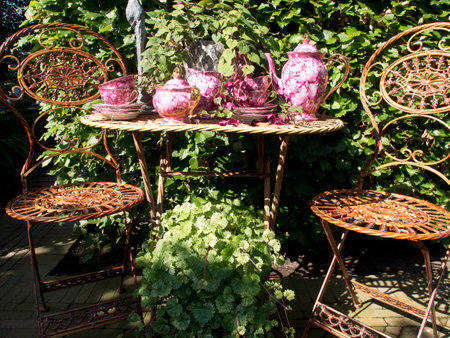Introduction: East Meets West in British Gardens
In recent years, a growing fascination with holistic living has inspired many Britons to seek harmony not only within their homes but also in their cherished outdoor spaces. This evolving trend sees traditional Chinese feng shui principles merging gracefully with the unique charm and sensibilities of British gardening. As garden enthusiasts across the UK look beyond aesthetics to embrace well-being, there is a rising appreciation for creating sanctuaries that are both visually delightful and energetically uplifting. The concept of positive Qi flow—central to feng shui—now finds new expression amidst rose beds, manicured lawns, and classic wooden benches nestled in the English countryside. By thoughtfully considering the optimal placement of garden furniture, homeowners can cultivate outdoor environments that nurture tranquillity, encourage connection, and harness life-affirming energies, all while staying true to the character of British landscapes.
Understanding Qi and Its Relevance to UK Outdoor Living
At the heart of optimal garden design lies the ancient Chinese concept of Qi (pronounced “chee”), a vital force believed to circulate throughout the environment and influence wellbeing. In traditional Eastern philosophy, Qi is considered the life energy present in all living things, shaping the harmony and health of both people and their surroundings. While this idea has its roots in ancient China, its principles can be thoughtfully adapted to enhance outdoor spaces across the UK, marrying time-honoured wisdom with British sensibilities.
Qi flow is closely linked to notions of balance, movement, and tranquillity in ones environment. When applied to garden furniture placement, it means arranging items so that energy circulates freely, avoiding blockages or areas where energy might stagnate. This approach resonates with growing British interest in wellness, mindful living, and creating gardens that are not just visually appealing but also restorative retreats from daily stresses.
The Impact of Energy Flow on Wellbeing
British gardens have long been sanctuaries for relaxation, reflection, and social gatherings. Integrating the concept of Qi offers a fresh perspective on why certain layouts feel more uplifting than others. A well-designed flow encourages positive emotions, reduces tension, and fosters a sense of connection between people and nature—values deeply embedded in British outdoor culture.
Cultural Adaptation: Bridging Tradition and Modernity
Adapting the philosophy of Qi for UK gardens involves blending Eastern principles with local traditions. Classic elements such as winding paths, open lawns, or secluded nooks can echo the meandering flow of energy while respecting established British landscaping styles. The table below illustrates how key concepts from Qi align with familiar features in UK outdoor living:
| Qi Concept | Traditional Chinese Application | UK Garden Interpretation |
|---|---|---|
| Unobstructed Flow | Clear pathways for energy movement | Open lawn areas; accessible walkways between seating zones |
| Balance of Elements | Harmony of water, wood, stone, metal, earth | Diverse planting; mix of natural materials like timber benches and stone patios |
| Sheltered Retreats | Pavilions or screens for protection and privacy | Arbours; pergolas; garden sheds providing cosy corners |
| Connection to Nature | Integration of landscape and built forms | Views onto flowerbeds; furniture facing scenic vistas or wildlife-friendly zones |
A Contemporary British Take on Ancient Wisdom
This cultural adaptation does not require a wholesale reinvention of British garden traditions. Instead, it invites thoughtful integration—placing furniture so that social spaces feel inviting yet open, positioning seating where morning sun or gentle breezes uplift the spirit, and ensuring paths encourage gentle circulation rather than abrupt stops. By considering both practical needs and invisible flows of energy, UK gardeners can create outdoor havens attuned to both tradition and modern lifestyles.

3. Fundamental British Garden Elements and Their Qi Implications
British gardens are celebrated for their unique blend of tradition and functionality, with each element playing a significant role in shaping the flow of energy—or Qi—throughout the space. Understanding the impact of classic features such as patios, lawns, hedges, and cottage borders is essential when optimising garden furniture placement to foster positive Qi in a UK outdoor setting.
Patios: The Social Heartbeat
Patios are a staple in British gardens, often serving as the central hub for gatherings and relaxation. From a Qi perspective, patios represent a stable yang energy zone where activity and conversation thrive. Placing furniture here should encourage movement and inclusivity without creating blockages; curved arrangements or circular tables can soften harsh lines, allowing energy to flow harmoniously around the area.
Lawns: Breathing Space for Energy
The quintessential British lawn provides an open expanse that acts as a canvas for Qi to circulate freely. Lawns function as yin spaces—calm and grounding—balancing the more structured or densely planted areas nearby. When positioning garden furniture on or near the lawn, it is crucial not to overcrowd this space. Minimalist benches or movable chairs at lawn edges invite gentle use while respecting the need for energetic openness.
Hedges: Natural Boundaries and Channels
Hedges are more than mere privacy screens in UK gardens; they channel and guide energy flow while providing shelter from prevailing winds. Tall or dense hedges can sometimes hinder Qi if placed indiscriminately. Ideally, any seating or dining arrangement should be set slightly away from solid hedge lines, using them as supportive backdrops rather than confining walls, thus fostering both protection and vitality.
Cottage Borders: Dynamic Edges of Life
The riotous mix of perennials and annuals found in cottage-style borders brings vibrant life and movement to the garden’s periphery. These lively edges promote active Qi circulation but can overwhelm if left unchecked. Furniture near these borders should be modest in scale—think small bistro sets or single loungers—to avoid disrupting the dynamic interplay between plant growth and subtle energy currents.
Synthesising Tradition with Flow
The harmonious integration of these iconic elements ensures that each feature supports rather than competes with the natural ebb and flow of Qi. By thoughtfully considering the traditional layout of British gardens alongside feng shui principles, one can position furniture in ways that enhance both comfort and energetic wellbeing for all who enter the space.
4. Optimal Orientation and Placement of Garden Furniture
Arranging garden furniture to promote positive Qi flow in British outdoor spaces involves a delicate balance between traditional Feng Shui principles and the distinctive characteristics of UK gardens. The unpredictable climate, limited space, and unique layout of many British gardens require practical solutions that harmonise ancient wisdom with modern realities.
Aligning with Qi Principles
Qi, or life energy, thrives in environments where movement is gentle and circulation is unobstructed. To achieve this in a UK context, position benches, tables, and loungers so they do not block natural pathways or entrances to your home or shed. Avoid placing seating directly in line with doors or gates—this can allow Qi to rush past rather than linger. Instead, angle furniture diagonally to guide the flow smoothly around your garden.
Practical Considerations for British Gardens
The compact nature of many UK gardens means maximising every inch while maintaining openness. Place larger items like tables centrally or near patios for easy access and social gatherings, but ensure theres enough space around each piece to allow free movement. In smaller gardens, opt for foldable benches or stackable chairs that can be easily rearranged depending on the occasion or weather.
Weather-Responsive Arrangements
The UK’s changeable weather calls for flexibility in furniture placement. Position loungers and benches in sheltered spots to protect from prevailing winds—typically coming from the southwest—while still allowing sunlight exposure from the south when possible. Use natural windbreaks such as hedges or trellises where appropriate to shield seating areas without creating stagnant corners where Qi could become trapped.
Quick Reference Table: Garden Furniture Placement Tips
| Furniture Type | Optimal Placement | Qi Principle | UK-Specific Advice |
|---|---|---|---|
| Bench | Against a solid wall/fence, facing open space | Support & stability | Shelter from wind; maximise sun exposure |
| Table & Chairs | Central patio/terrace, not blocking paths | Encourages gathering & harmony | Easy to move under cover if rain threatens |
| Loungers | Semi-shaded spot, angled for privacy & view | Smooth Qi flow; relaxation zone | Avoid damp areas; use movable models for sun tracking |
By thoughtfully orientating and placing your garden furniture with these principles and practicalities in mind, you will foster both a harmonious energy flow and an enjoyable outdoor living environment tailored to the unique spirit of British gardens.
5. Integrating Local Materials and Styles for Harmonious Qi
When optimising the flow of positive qi in your UK garden, the choice of furniture and ornaments plays a pivotal role. By selecting pieces crafted from locally sourced materials, you not only reinforce a sense of place and belonging but also contribute to sustainability—a value increasingly central in British society. Timber from native species such as oak, ash or chestnut, when fashioned into benches or tables, naturally resonates with the land’s energy, grounding the space and fostering a calming atmosphere. Traditional British stone, like Cotswold limestone or Welsh slate, can be used for pathways, plinths, or decorative features, inviting stability and strength into the garden’s energetic flow.
Celebrating British Craftsmanship
Opt for furnishings handcrafted by local artisans whenever possible. Not only does this support local economies, but the unique character imbued in each piece enhances the garden’s individuality and authenticity—two qualities that encourage a positive exchange of energy between people and place.
Ornamental Touches for Balance
Incorporate ornaments such as wrought iron lanterns, terracotta pots from regional clay, or water features made using reclaimed materials. These touches bring elements of fire, earth, and water into harmony with the wood and metal already present in classic British gardens.
Sustainable Choices for Enduring Energy
Choosing furnishings with minimal environmental impact extends beyond material selection; consider items with longevity and timeless design over fleeting trends. This approach not only conserves resources but ensures that your garden remains a sanctuary of positive qi for years to come.
By embracing local materials and styles rooted in UK heritage, you create outdoor spaces that both nurture the environment and promote harmonious energy circulation—an enduring blend of tradition and mindful modern living.
6. Cultural Nuances: Embracing British Weather and Social Rituals
When considering the optimal placement of garden furniture for positive Qi flow in UK outdoor spaces, it is essential to weave in the fabric of British cultural traditions and the ever-unpredictable weather. The British affinity for outdoor gatherings, from leisurely afternoon teas to spirited summer barbecues, shapes both the function and arrangement of garden settings. By thoughtfully incorporating these time-honoured pastimes into your garden layout, you can foster a sense of community while enhancing wellbeing through harmonious design.
Accommodating the British Climate
The UK’s variable weather necessitates adaptable solutions. Positioning seating areas under pergolas or near mature trees offers both shelter from sudden rain showers and dappled sunlight on brighter days. Portable parasols and strategically placed benches ensure that guests are comfortable regardless of the elements, supporting ongoing use throughout the seasons and maintaining an unbroken flow of positive energy.
Inviting Traditional Social Rituals
To truly embrace British culture, create designated zones for cherished social rituals. Place a sturdy table and comfortable chairs on a south-facing patio to serve as a stage for afternoon tea—a ritual that embodies relaxation and conviviality. Ensure clear pathways lead smoothly from the house to this focal point, promoting seamless movement and facilitating interaction, which is vital for nourishing collective Qi.
Celebrating Community Through Layout
Larger lawns or open spaces can be subtly divided using planters or low hedges to allow for lively gatherings such as picnics or garden parties. Arrange furniture in gentle curves or semicircles rather than rigid lines; this echoes natural forms and encourages inclusive conversation, a hallmark of British hospitality. Incorporating these subtle cultural nuances into your garden’s design not only honours tradition but also cultivates positive energy that resonates with both residents and visitors alike.
7. Conclusion: Achieving Balanced Bliss in Modern British Gardens
Thoughtfully arranging garden furniture is more than a question of aesthetics; it is a conscious act that can transform outdoor spaces into sanctuaries of positive energy, especially within the context of the UK’s distinctive climate and cultural sensibilities. By respecting traditional principles of Qi flow and harmoniously integrating them with contemporary British lifestyles, homeowners can create gardens that nurture well-being and conviviality throughout the year. Whether you are enjoying a cup of tea on a secluded bench or gathering friends around a weather-resistant dining set, strategic placement ensures both comfort and vitality. Ultimately, embracing this mindful approach allows every corner of your garden—be it a compact city terrace or a sprawling country lawn—to become a personalised haven that echoes the timeless charm and modern rhythms of British life. This balanced blend invites not only visual delight but also a subtle sense of peace, enabling all who enter to experience an invigorating retreat tailored perfectly to the UK’s unique outdoor tapestry.


